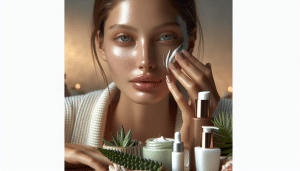Secrets You Miss About Daily Skincare Routines
Natalie Brooks September 12, 2025
Explore the science of daily skincare routines and why they matter for radiant, protected skin. Discover how healthy habits, product choices, and everyday adjustments can make a difference—supported by expert-backed resources and practical insights for your everyday wellness.
Understanding Why Skincare Routines Matter
It’s easy to underestimate the impact of a consistent daily skincare routine on overall wellness and beauty. A proper routine does far more than just help prevent breakouts or dryness. Consistency in caring for skin helps protect against external factors like pollution, UV rays, and fluctuating climates, keeping the skin barrier healthy and resilient. Many people notice that over time, a well-chosen regimen improves both the look and feel of the skin. Scientists at trusted health organizations have found that skincare can even influence mood and confidence (Source: https://www.ncbi.nlm.nih.gov/pmc/articles/PMC6017965/).
Daily skincare habits align with a preventative approach to skin wellness. Protecting skin from premature aging, environmental damage, and dullness often means prioritizing regular cleansing, moisturizing, and sun protection. Even small changes—a gentler cleanser, a better moisturizer, or the inclusion of sunscreen—can have accumulative results. Experts recommend routines that suit individual skin types, supporting both visible beauty and underlying skin health (Source: https://www.aad.org/public/everyday-care/skin-care-secrets/routines).
The choices made in a daily skincare regimen reflect not only individual needs but also shifting research in dermatology and wellness. Those who adapt their routines to evolving knowledge—from using antioxidants to layering lightweight serums—can optimize outcomes. Staying current with research from trusted beauty and wellness sources is a great way to discover ingredients and approaches that fit your unique lifestyle.
Step-by-Step Essentials for Healthy Skin
The foundation of an effective skincare routine begins with gentle cleansing. This clears away environmental debris, makeup, and excess oil that can clog pores or exacerbate skin issues. Dermatologists encourage finding a cleanser formulated for your unique skin type—whether dry, sensitive, oily, or combination. Removing impurities without stripping natural oils helps maintain a balanced skin barrier and prepares skin to better absorb subsequent products.
After cleansing, hydration becomes key. Moisturizers work by trapping water in the skin and reinforcing the protective layer that keeps irritants out. They’re beneficial for all skin types, and using different textures—like gel for oily skin or cream for dry skin—provides tailored support. Some moisturizers feature added ingredients such as peptides or hyaluronic acid for extra nourishment, smoothing, and plumpness (Source: https://www.health.harvard.edu/staying-healthy/skin-care-tips-for-healthy-winter-skin).
The final daily step for most routines is broad-spectrum sunscreen. Sunscreen prevents both immediate sunburn and longer-term photodamage, including wrinkles and uneven skin tone. The American Academy of Dermatology recommends at least SPF 30 applied every morning—regardless of season or weather. Reliable sunscreen use is now recognized as one of the single most important wellness investments for skin health and beauty (Source: https://www.cancer.org/healthy/be-safe-in-sun/sunscreen-and-sun-safety.html).
Ingredients That Make a Difference
Different active ingredients target specific skincare concerns and can be chosen based on personal goals or seasonal needs. Vitamin C serums brighten the complexion and help address hyperpigmentation. Retinol, a derivative of vitamin A, is known for its scientifically proven anti-aging benefits. Niacinamide helps regulate oil production and reduce redness, making it popular with sensitive skin types.
Natural ingredients like aloe, green tea extract, and chamomile bring a soothing effect and are especially valued by those with reactive or inflamed skin. Beauty experts suggest checking for irritation or sensitivity when adding new ingredients. Patch testing unfamiliar products on a small area before full application can help avoid unwanted reactions. It’s often helpful to slowly introduce potent ingredients such as acids or retinoids into any routine.
Hydration boosters like hyaluronic acid and glycerin have gained attention for their ability to draw water into the skin, preventing flakiness and supporting a smooth texture. Products with antioxidants protect the skin from free radical damage, supporting both beauty and long-term wellness. Ingredient transparency—choosing products that clearly list concentrations and purposes—makes it easier to build routines that truly work for your needs (Source: https://www.skin.cancer.org/blog/the-science-of-skincare-ingredients/).
Addressing Common Skincare Myths
Skincare routines are surrounded by persistent myths. One misconception is that oily skin doesn’t need moisturizer. In truth, skipping hydration can cause an increase in oil production, which may worsen breakouts. Another myth is that expensive products always work better. Experts say that even simple, affordable routines offer substantial benefits. It’s more about ingredient quality and routine consistency than price.
Some believe sunscreen is unnecessary on cloudy days or indoors, but research confirms that UVA rays penetrate windows and clouds. Consistent sunscreen use helps prevent cumulative sun damage, one of the top contributors to premature aging. There’s also confusion over how often to exfoliate. Over-exfoliation can strip the protective skin barrier, while gentle weekly exfoliation can support smoother skin and improve absorption of beneficial ingredients (Source: https://www.aad.org/public/everyday-care/skin-care-secrets/expert-skin-care-tips).
The idea that men should use different skincare products than women is not universally true. Many ingredients, such as SPF, hyaluronic acid, and antioxidants, benefit all skin types regardless of gender. Individuals should select products based on their concerns rather than marketing claims. Evidence-based tips are the most reliable way to improve routines and avoid common mistakes, as outlined by leading wellness and dermatology organizations.
Personalizing Your Skincare Approach
Personalized skincare acknowledges that no two skins are the same. Genetics, environment, age, and stress all play roles in unique skin challenges. The increasing popularity of skin assessments—available from dermatologists and wellness clinics—supports choosing routines tailored to individual needs. Users benefit from adjusting products for seasonal variation or hormonal changes, as the skin’s needs often shift over time (Source: https://www.mayoclinic.org/healthy-lifestyle/adult-health/in-depth/skin-care/art-20048237).
Routine adjustments don’t require an overhaul every time you encounter a new product trend. Many experts suggest introducing no more than one new product at a time, so skin can adjust and respond. Tracking progress by taking photos or keeping a skincare journal helps evaluate what actually works and what doesn’t. For those with persistent concerns, consultation with a board-certified dermatologist can provide clarity and unlock solutions beyond over-the-counter options.
Combining modern science with careful observation of your own skin leads to the most successful outcomes. Wellness platforms frequently share new findings about microbiome health, adaptation to climate, and innovative formulations. Embracing both expert advice and personal experimentation lets you build a routine that supports long-term beauty and feels good day to day.
Mistakes to Avoid for Lasting Results
Some habits inadvertently undermine skincare efforts. Overwashing can dry out or irritate the skin, disturbing its natural moisture balance. Using harsh physical scrubs rather than gentle chemical exfoliants may cause micro-tears in the skin barrier. Being patient is vital; most products take several weeks of consistent use to reveal visible results, and abrupt changes can often do more harm than good.
Product layering requires attention to ingredient compatibility. For example, combining retinol with high concentrations of vitamin C or acids may lead to irritation for some. Following guidance from professional dermatology organizations helps navigate these combinations safely. It’s equally important not to skip patches during application, as forgetting areas like the neck or hands can allow premature aging to show in unexpected places.
Ignoring overall wellness—nutrition, hydration, and sleep—limits the benefits of external routines. Healthy skin starts from within, meaning skincare is only one part of a larger self-care puzzle. Setting realistic goals and expectations ensures you enjoy the process rather than feeling frustrated by imperfections. Small, thoughtful daily habits can deliver surprising improvements over time, supporting both beauty and well-being (Source: https://www.cdc.gov/healthyweight/healthy_eating/index.html).
References
1. American Academy of Dermatology Association. (n.d.). Skin care routines. Retrieved from https://www.aad.org/public/everyday-care/skin-care-secrets/routines
2. Harvard Health Publishing. (n.d.). Skin care tips for healthy winter skin. Retrieved from https://www.health.harvard.edu/staying-healthy/skin-care-tips-for-healthy-winter-skin
3. National Institutes of Health. (2018). Psychological benefits of skincare. Retrieved from https://www.ncbi.nlm.nih.gov/pmc/articles/PMC6017965/
4. American Cancer Society. (n.d.). Sunscreen and sun safety. Retrieved from https://www.cancer.org/healthy/be-safe-in-sun/sunscreen-and-sun-safety.html
5. Skin Cancer Foundation. (n.d.). The science of skincare ingredients. Retrieved from https://www.skin.cancer.org/blog/the-science-of-skincare-ingredients/
6. Mayo Clinic. (n.d.). Skin care: 5 tips for healthy skin. Retrieved from https://www.mayoclinic.org/healthy-lifestyle/adult-health/in-depth/skin-care/art-20048237








